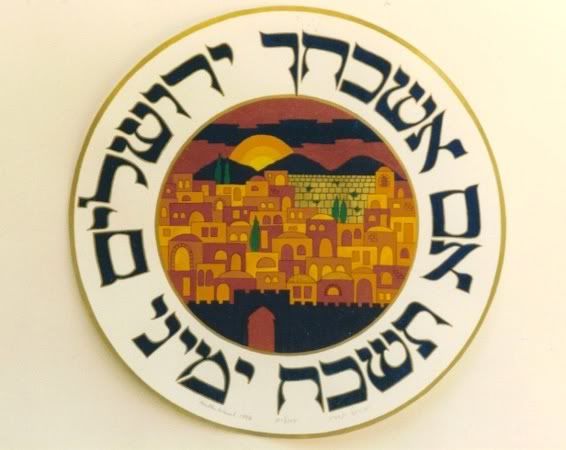It seems that the town of Elkana is in the midst of a debate that has been bugging me for a while. Is Chabad part of Orthodoxy? YNet reported on May 29th that the Rabbanut of Elkana is refusing to adjust their mikveh to Chabad standards because "the Chabad movement is not part of the Jewish Orthodox group and therefore it can not use the facilities of this group".
Them be fightin' words.
The Rabbanut never said such any such thing; they're just thinking it. "Obviously they are kosher Jews, until they begin acting in a compulsive way, all the while refuting the authority of the community rabbi," said Motti Minzer the representative of the Rabbanut.
The problem here is that any small group (Ashkenazim/Sefardim/etc.) are not going to give up and use a mikveh they deem inadequate. The Rabbi feels no obligation to give in - the local rabbanut is the local rabbanut - it's their call.
I agree, but that brings us to the original question. Is Chabad Orthodox?
In short, I'd say no. And so would they. Chabad doesn't call itself Orthodox, they call themselves Hasidic and Jewish, but the label "Orthodox" appears nowhere on their webpage.
If being Orthodox is nothing more than just a label, why does it matter? I personally hate the term, I'm not religious to be Orthodox, I'm religious because it's what Jews do and what Jews believe. If that makes me Orthodox, then fine - I couldn't care less.
What the label provides is a litmus test to gauge everybody else by. That gauge may or may not be the 13 Ikkarim, it may be some other "test". But it seems that whatever the test should include, at the very least more than one group of those calling themselves Orthodox should adhere to it.
Thus, saying strict adherence to R' Teitelbaum is not accepted since nobody outside the Satmar Community would agree. Torah Min HaShamayim probably would go on the test. So what about the Chabad claim that Rebbe as Moshiach? Is this something that can be written off like the followers of some other movements?
I don't believe so. Messianic claims are too important to the klal to be accepted by any part and not the whole. Thus, Chabad (since it cannot seem to differentiate the elements within itself) has eliminated itself from normative Orthodoxy. It is possible, that if Chabad could purge the Messianic elements from its ranks that it could regain its former status. But if, as some scholars have suggested, most Chabad Rabbis are Meshichi or at the very least accept it as a legitimate belief; then no, Chabad cannot be part of the Orthodox community.
So what now? Chabad isn't Orthodox. It's Chabad and I think they're just happy with that. It doesn't necessarily mean to cut off all ties (it may for certain elements); but these Lubavitchers in Israel should either use the current Mikveh or build their own.
Subscribe to:
Post Comments (Atom)

4 comments:
B"H
Chabad is accepted as Orthodox movement it's Rabbis among whom are open Mashichistim like Rabbi Garelik for example are on the list of the Rabbis whose converssions are automaticly accepted if you or Berger or few others disagree it doesn't yet make it universaly accepted halachik opinion.
It's clearly not the universal practice, but it doesn't mean that it isn't the opinion of the klal nor does it mean that it isn't the way it should be.
I like Chabad for all the good it does (part of the reason why it's not ostracized for its kefira), but it cannot be ignored that it has removed itself from the general stream by accepting kefira in its ranks.
I think part of the point of the post was that Chabad refuses to self-identify itself as "Orthodox".
Kefira??? Chas V'Shalom!!! I assume you are referring to those in Chabad who believe that the Rebbe didn't really pass away from this world. Although I don't agree with them, I can understand where they're coming from and it's no way a place of kefira. We all should understand that out Torah teaches us that just as the life of a Tzaddik is totally different from regular people, so is the passing of a Tzaddik very different. "Yaakov Avinu Lo Meit" (Yaakov didn't die) the Gemara tells us, and although Rav Nachman didn't understand it literally, Rav Yitzchak did. The Zohar teaches that when a Tzaddik passes on "his influence is found more in all the worlds (incl. this one) more then when he was in a body" The Zohar also says that "the soul of a Tzaddik retains its connection with the body even after his passing". Do you understand the Gemara which says that Rebbe (Rav Yehuda HaNassi) made kiddush for his family every Friday night for ten years after his passing? Or do you understand how Eliyahu HaNavi's physical body was never buried but went up in a whirlwind to the spiritual world? Did Eliyahu HaNavi's body die? Our tradition is full of stories of Eliyahu HaNavi coming back in a body (presumably his) and doing miraculous acts. I think that the Chabadniks who believe the Rebbe is alive believe that he is alive the same way they believe that Yaakov Avinu is alive. My main contention with them is that while they will go to Chevron to pray at Yaakov Avinu's gravesite they don't visit the Rebbe's gravesite because they think he wasn't even buried (they think that the whole funeral procession was a "Maaseh Satan" just like the Satan showed the Jews a vision of Moshe Rabeinu in a coffin in order to cause them to err with the Golden Calf). To me, not believing the Rebbe was buried is just plain stupid. But it's not kefira.
Post a Comment